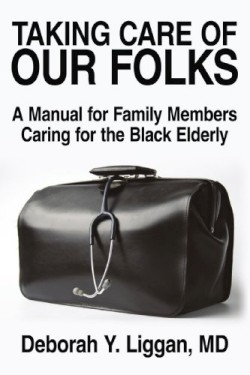Taking Care of our Folks
A Manual for Family Members Caring for the Black Elderly
Deborah Liggan’s Taking Care of Our Folks is a medical manual for the African American community, a timely book in light of the nation’s aging population and today’s crisis in heath care. Armed with the detailed medical information this book offers, caregivers will be better prepared to navigate the labyrinth of treatment opportunities.
Liggan, a physician and researcher with a broad range of experience, focuses on biological differences that, coupled with cultural beliefs and medical biases, lead to gaps in effective treatment for elderly black Americans.
She discusses a range of ailments prevalent in the elderly, among them mental health, nutrition, cancer, and gastrointestinal disorders. In addition to explanations of symptoms and diagnoses, Liggan evaluates treatment with an eye to psychological factors to be considered in choosing the proper treatment.
About managing arthritis pain, for example, she writes, “Compared with whites, blacks with arthritis are less likely to see a rheumatologist, to use prescription arthritis medicines, or to undergo total joint replacement, and they are more likely to perceive prayer as helpful treatment.” Therefore, she points out, it’s important to take into consideration the patient’s preference for natural remedies, beliefs about God’s control, and fear of surgery among other psychological factors, even the desire of patients “to remain in their current state.”
Twenty-seven chapters provide an overview of each disease, including symptoms, diagnostic tools, treatment possibilities, and care and support suggestions. Case studies are included that provide snapshots of a patient’s symptoms, and each chapter ends with a list of selected readings on the topic. The statistics showing where elderly African Americans fall on the spectrum of a broader demographic are particularly interesting and important to proper diagnosis and treatment.
Liggan’s research shows that cardiovascular disease is disproportionately higher among African Americans, with black men having a forty-seven percent greater chance of dying from this than white men, and black women a sixty-seven percent greater likelihood than white women. She cites evidence that suggests “social disparities between African Americans and white Americans have far more influence over prevalence of cardiovascular disease than genetic differences.”
Why treatment varies for different ethnicities remains a question; both biological differences and access to care are possibilities, although research shows that in the case of cardiovascular disease, living in a disadvantaged neighborhood trumps race. Many such interesting comparisons are provided.
Taking Care of Our Folks makes it clear that proper medical treatment is not a “one size fits all” proposition, and that race, gender, and psychological and sociological factors all play a role in proper diagnosis and treatment of various illnesses. Liggan has provided a solid medical compendium of diseases prevalent in the black community for those she calls her “primary audience”: “the inquirer who needs a brief authoritative introduction to the key topics and issues in aging within this ethnic group.”
Disclosure: This article is not an endorsement, but a review. The publisher of this book provided free copies of the book and paid a small fee to have their book reviewed by a professional reviewer. Foreword Reviews and Clarion Reviews make no guarantee that the publisher will receive a positive review. Foreword Magazine, Inc. is disclosing this in accordance with the Federal Trade Commission’s 16 CFR, Part 255.

